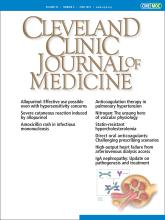ABSTRACT
Hydroxychloroquine (HCQ) is in short supply as a result of the coronavirus disease 2019 (COVID-19) pandemic, presenting a challenge to rheumatologists to ensure their patients with systemic lupus erythematosus (SLE) continue to take this essential drug. HCQ is the only SLE treatment shown to increase survival and any change in the HCQ regimen is potentially dangerous. Changes in the HCQ regimen should be made jointly with the patient after a discussion of the available evidence and expert opinion and the patient’s preferences. Providers need to make thoughtful, informed decisions in this time of medication shortage.
LUPUS AND HCQ
Hydroxychloroquine (HCQ) is in short supply as a result of the coronavirus disease 2019 (COVID-19) pandemic, presenting a challenge to rheumatologists to ensure their patients with systemic lupus erythematosus (SLE) continue to take this essential drug, the only SLE treatment shown to increase survival.1,2
Although the optimal daily dose of HCQ in SLE is a subject of controversy, it is typically 5 mg/kg of real body weight per day in accordance with the 2016 American Academy of Ophthalmology recommendations to avoid ocular adverse effects including corneal deposits, posterior subcapsular cataract, ciliary body dysfunction, and toxic retinopathy. HCQ is available in 200-mg tablets, and many patients take different daily doses to maintain a weekly average of 5 mg/kg/day: for example, 400 mg one day, and 200 mg the next day.
While there is much to be elucidated regarding dosing and monitoring of optimal therapeutic blood levels, recent studies have found that patients with HCQ levels 750 ng/mL or higher had both a clinically meaningful and statistically significant decrease in disease activity.3 Conversely, noncompliance resulting in a low blood HCQ concentration has been shown to be a marker and predictor of SLE exacerbation.4 Further, and most relevant to the current COVID-19 shortage dilemma, discontinuation of HCQ in patients with quiescent disease was shown to be associated with a 2.5-fold increase in the risk of new clinical manifestations or, in the case of previous manifestations, a recurrence or an increase in severity.5 These studies underscore the importance of uninterrupted therapy in our SLE patients.
In light of the current HCQ shortage related to the COVID-19 pandemic, the American College of Rheumatology’s newest guideline on allocating this scarce resource states that, based on shared decision-making with the patient, it is reasonable to “pursue HCQ dose reductions and extend HCQ dosing intervals tailored to the individual patient’s needs when faced with HCQ shortages.”6 The practices I have instituted within my patient population with these guidelines in mind are as follows:
In patients who are pregnant and in patients whose disease is or has been severe or difficult to control, the risk of flare due to loss of efficacy from subtherapeutic HCQ blood levels is too high, and I would not modify the dosing regimen. Proper coding emphasizing SLE acuity and organ involvement when ordering prescriptions for a 90-day supply and direct discussion with a pharmacist or a peer-to-peer review is often necessary in these situations.
In stable patients with mild disease, it may be more reasonable to conditionally recommend a dosing adjustment. Patients on more than 200 mg/day may decrease to 200 mg daily (1 tablet daily), and those on 200 mg daily may take their dose every other day. This strategy is implemented in the hope that blood levels will decrease slowly enough to mitigate fast shifts and subsequent flares.
Any change in the HCQ regimen is potentially dangerous, and any change should be made jointly with the patient after a discussion of the available evidence and expert opinion and the patient’s preferences. HCQ is too precious a resource to our SLE patients to take blanket action. As providers, we need to make thoughtful, informed decisions in this time of medication shortage.
Footnotes
The statements and opinions expressed in COVID-19 Curbside Consults are based on experience and the available literature as of the date posted. While we try to regularly update this content, any offered recommendations cannot be substituted for the clinical judgment of clinicians caring for individual patients.
- Copyright © 2020 The Cleveland Clinic Foundation. All Rights Reserved.






